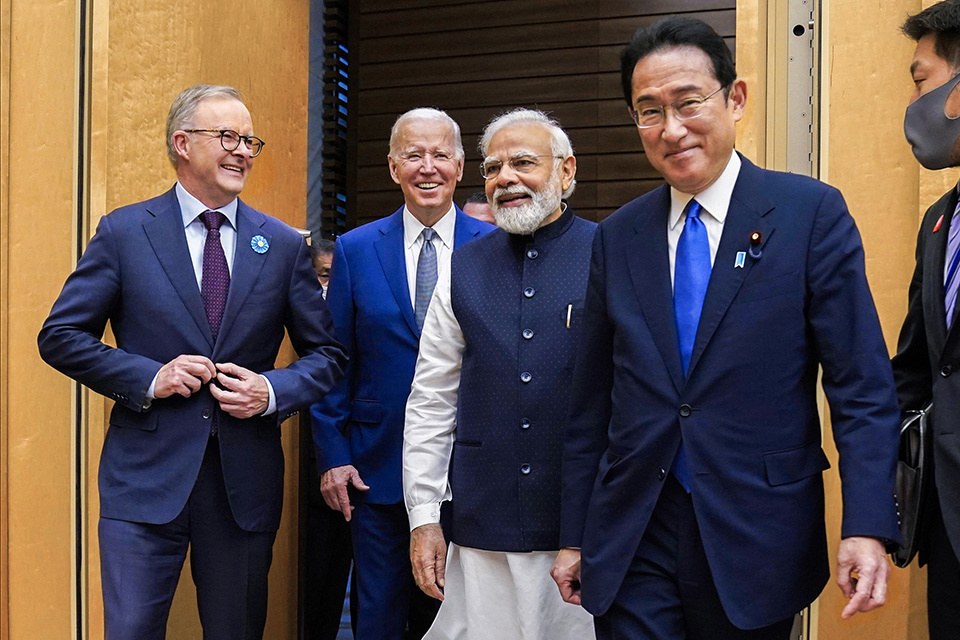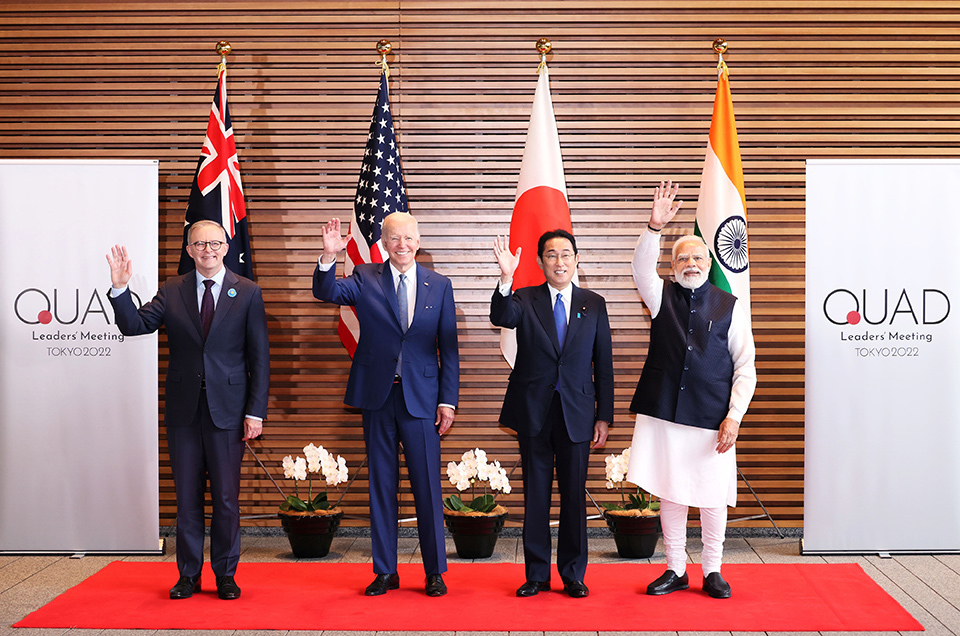MAY 24, 2022


The four countries have been promoting practical cooperation in various fields to realize a Free and Open Indo-Pacific and concurred on the importance of making positive contributions to the region.
On May 24, 2022, the Japan-Australia-India-U.S. (Quad) Leaders’ Meeting was held in Tokyo. Amid the situation of Russia’s aggression against Ukraine, which has shaken the very foundations of the international order, the four countries reconfirmed that no unilateral change of the status quo by force is tolerated in any region, especially in the Indo-Pacific, and they remain strongly committed to the realization of a Free and Open Indo-Pacific. The four leaders shared the view that the Quad is a force for good, committed to bringing tangible benefits to the region. They confirmed that they would continue to work in close cooperation and released the QUAD Joint Leaders’ statement.
Prime Minister Kishida, in his opening remarks at the press conference following the Quad meeting, mentioned that the four leaders had concurred in the decision to hold the next Leaders’ Meeting in Australia in 2023, and expressed the hope that they would further strengthen the Quad’s cooperation.
The following is the full text of the statement.
****
I invited President Biden of the United States, Prime Minister Modi of India, and Prime Minister Albanese of Australia to Tokyo, where today I, as the meeting Chair, convened the second in-person meeting of the Japan-Australia-India-U.S. (Quad) Leaders' Meeting, following one last September.
The four Quad leaders held candid discussions on the impact the situation in Ukraine has on the Indo-Pacific region and expressed our concern regarding the tragic conflict in Ukraine in a way that India also joined. We confirmed that the various principles of the rule of law, sovereignty, and territorial integrity must be upheld in every region of the world.
We also discussed North Korea, which even this month launched ballistic missiles in quick succession and is intensifying its nuclear and missile activities, and we agreed to act in cooperation towards the complete denuclearization of North Korea. With regard to the increasingly serious state of COVID-19 infections in North Korea, we also discussed preventing a geographical blank from forming. All four Quad countries also saw eye to eye on the necessity of an immediate resolution to the abductions issue.
In addition to these issues, we engaged in substantial discussions on the situation in the Indo-Pacific region, including our grave concerns regarding attempts to unilaterally change the status quo in the East China Sea and South China Sea, responses to the situation in Myanmar, and other matters.
The Quad summit is also a venue for advancing practical cooperation across a wide range of fields in order to realize a Free and Open Indo-Pacific.
In vaccine-related cooperation undertaken thus far, our cooperation is advancing, including progress towards supplying vaccines under the Quad Vaccine Partnership and the signing of a loan agreement between the Japan Bank for International Cooperation (JBIC) and the Export-Import Bank of India (EXIM Bank) that will facilitate a total of US$100 million in assistance for the healthcare sector.
In the area of infrastructure, we announced we will aim to provide more than US$50 billion in further assistance and investment in the Indo-Pacific region over the next five years. We also agreed to undertake capacity building support in countries facing debt problems.

The Quad is playing an important role in promoting a Free and Open Indo-Pacific. At the Leaders’ Meeting, the Quad confirmed that they will seek to supply the region with more than 50 billion dollars of further infrastructure assistance and investment over the next five years. AP/AFLO
The Indo-Pacific region is a region with frequent natural disasters and a large number of countries vulnerable to climate change and other threats. In the area of space, through this meeting we established a system for providing to countries in the region satellite information owned by the Quad countries. This information can be used for various objectives, including disaster prevention, climate change countermeasures, and the sustainable use of marine resources. In order to respond more effectively to natural disasters in the region, we also agreed on a partnership that strengthens the collaboration among the four Quad countries in the areas of humanitarian assistance and disaster relief. Furthermore, in the area of maritime security, the Quad leaders welcomed the new initiative for maritime domain awareness, which will promote information sharing among countries in the region.
Against the backdrop of Russia’s aggression towards Ukraine, a situation that undermines the very foundation of the international order, and in light of the participation in this summit meeting of President Biden and Prime Minister Modi and also Prime Minister Albanese, who joined us despite having just assumed office, I consider it to be of paramount importance that from Tokyo we sent out a powerful message to the world that unilateral changes to the status quo by force cannot be tolerated in any region of the world, and especially not in the Indo-Pacific region, and that a Free and Open Indo-Pacific is absolutely imperative now more than ever, and that the four Quad leaders are committed to doing their very utmost to bring it about.
This kind of cooperation by the Quad countries has spread across a wide range of fields and collaboration at various levels is getting deeper day by day. During our meeting, Prime Minister Albanese proposed holding next year's Quad summit in Australia. I very much look forward to further intensifying the cooperation among our four countries towards the realization of a Free and Open Indo-Pacific.
Background of Japan-Australia-India-U.S. (Quad)
December 2004
In the aftermath of the earthquake off the coast of Sumatra and tsunami disaster in the Indian Ocean, Japan, Australia, India and the U.S. formed a core group to lead the international community’s support.
May 2007
Quad officials held a meeting for the first time. Senior officials meetings have been held on a regular basis since November 2017.
September 2019
The first Foreign Ministers’ Meeting in New York
March 2021
The first Leaders’ Video Conference
September 2021
The first in-person Leaders’ Meeting
May 2022
The second in-person Leaders’ Meeting






























